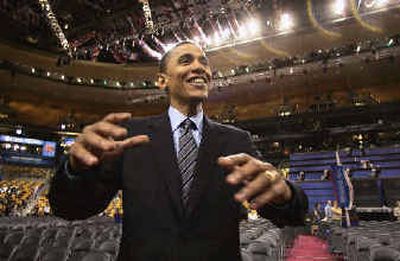Blacks have no one leader

BOSTON – In a narrow corridor beside an empty parking lot, the Rev. Jesse Jackson was working the cell phone while aide Jerry Thomas was spinning a passing reporter.
Thomas’ argument: Read the Boston Globe column about Jackson and the polling results that show he has retained his role as leader of the most valuable component of the Democratic voting amalgam, African Americans.
It was the 20th anniversary of Jackson’s first attempt as a presidential candidate, Thomas said, repeating the theme Jackson wrote about himself on The Globe’s op-ed page. “Don’t count Jackson out,” said the headline on Adrian Walker’s Globe column.
Everything Thomas cited was aimed at emphasizing Jackson’s dominant role in the black community. There is no doubt that Jackson retains tremendous political influence. His media schedule was packed for the whole week.
Why, then, was this happening?
The Democratic Party is shifting into a new era, with a new generation of political figures moving rapidly to the fore. The jockeying caused by that shift is evident and has caused tension within the hierarchy of black leaders, with the old order straining to maintain its influence and the new order, feeling its day has arrived, seeking to expand its own.
Looking at the scene from a distance, the key players now are Jackson, the Rev. Al Sharpton, and a newer face, Barack Obama, the U.S. Senate candidate from Illinois who has been embraced by the national Democrats as an all but certain future senator.
Obama, currently facing no Republican challenger, would be the only black in the Senate, and only the third since Reconstruction. Already, before he has even left the Illinois Legislature, serious political analysts have discussed him as a possible future presidential or vice presidential candidate.
Some of those outsized expectations, Obama admits, come because of the paucity of blacks in prominent national political roles. At the same time, the idea that anyone will emerge as the single figure representing the black community, a role played by Jackson for so many years, has all but evaporated.
“It is not necessary to have one black leader,” said U.S. Rep. John Lewis, D-Ga., “We have degrees and levels of black leadership. There is no one spokesperson for the African American community. Our constituency is very diverse. And that is very healthy.”
To be sure, from the day of Dr. Martin Luther King Jr.’s assassination, no one has been able to maintain influence with black voters without working hard, and there may be no one who has worked harder than Jackson. Bitter personal conflicts have long been a part of the civil rights hierarchy as various factions competed for leadership roles before and after King’s death.
Despite the renewed quest for influence, there is no doubt about the loyalty of black voters to the Democratic cause. This struggle is about stature, not only within the black community, but also within the Democratic Party at large, which has money and patronage to pass out as the presidential campaign proceeds.
Ron Walters, a political scientist at the University of Maryland, College Park, said it is no surprise that there is competition to define leadership roles within the black political community.
“One generation wants to succeed another and they are always impatient,” he said. “The older generation is never ready to go because there are fewer options out there.”
There are no clearer examples of the two sides of the contest than Jackson, whose roots stretch back to King and the earliest days of the struggle for civil rights and Sharpton, who won his media stripes with controversial behavior, but who has become more moderate over the past few years. He mounted his own presidential bid this year.
Sharpton will speak at the convention today, but Jackson’s formal role remained unclear.
“In many ways, it is a unified choir. There are many voices, but basically they are singing from the same hymnbook,” said Jackson. “Sometimes people say, ‘Who is their leader.’ You should look at us through a door, not a keyhole.”
Said Sharpton: “Ultimately, the movement and drive for empowerment ought to continue from one generation to the next. There should not be conflict.”
Obama dismisses debates about single emerging black leaders and their relevance.
“I think there is this notion that black people only get one leader at a time, which is really sort of an odd notion. There are a lot of voices,” Obama said.